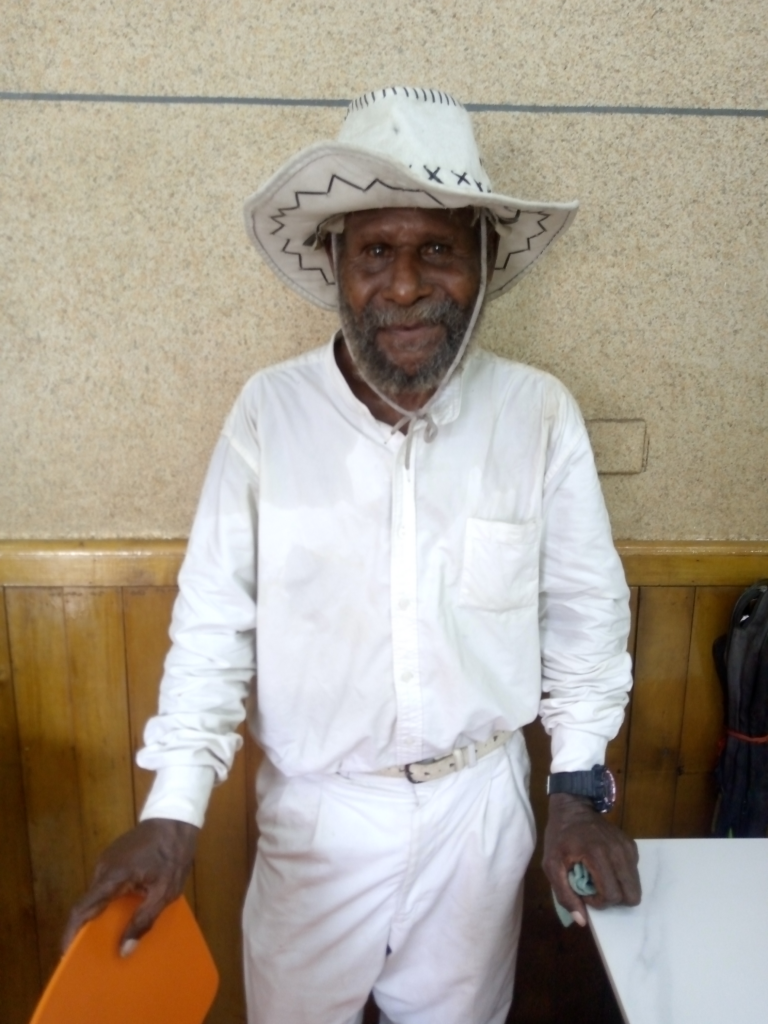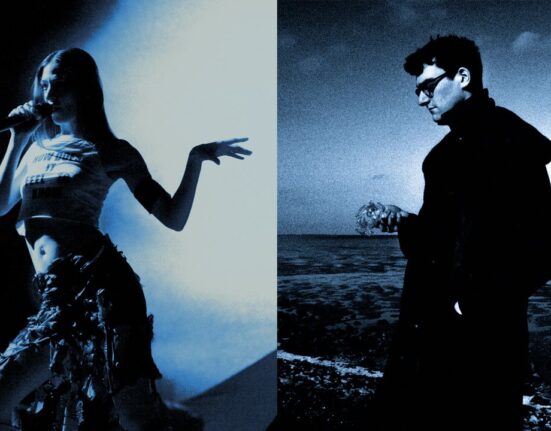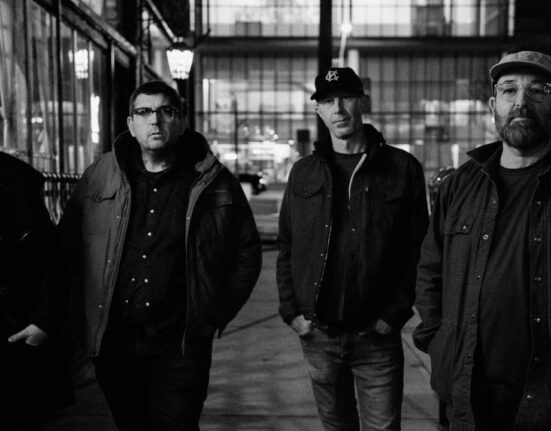COVER STORY
MUSICIANS performing on the street side is not common.
Having lived and worked in Wewak in East Sepik, Kavieng in New Ireland, and Port Moresby in the National Capital District, at different times over the past 20 years, I have observed that buskers are more common in the big city than in the other two smaller centres.
So, upon returning to Wewak in May, it was a wonder to see a particular gentleman – clad in white and donning a white hat – strumming an acoustic guitar and singing beside a shop in Wewak. He has an interesting story, and it goes well before 1975.
Days before Independence
Have you wondered what it was like back in the 1970s and 60s in Papua New Guinea? For those of you who were born after 1975, you may not know anything about those days, and how significant certain decisions made were, including the need for Papua New Guinea to gain Independence.
It is for people like you that I am talking to the elders, people who were there then and have memories of what it was like.
This is the first of a number of such articles that I will share with you in the coming weeks, narratives that will take us back to the 1960s and 1970s, and maybe even beyond those decades. It is my hope that when we revisit the times and changes in those early days, then we can better compare and evaluate the times we are in today.
Are we better today, or not? That is a basic question that will be asked.
Should we learn from the past and make correct turns to ensure we recapture the glory of those days that had defined us as a nation?
That is another good question to help guide our quest to learn about the past.
Where it all started
The musician who plays the guitar to entertain passersby in Wewak is Leo Wasi. Although he sings with a foreign accent, his life began back in Kirimbit village in Chambri, East Sepik.
Born in 1953, Wasi grew up in a family of eight – with two girls and five boys.
“I am over 73 years old now; I am the second in the family,” the musician said.
down to entertaining passersby on the streets of Wewak town.
From the village, Wasi started school and made his way out to do his high school. While in high school, he applied to join the Fire Service.
The service selected him and gave him a plane ticket to travel to Lae, in Morobe, for training.
That was his first training after high school, and he enjoyed every bit of it, including the fact that he was now being taken care of by a national division and was no longer looked after by his relatives back in East Sepik. He worked with the Fire Service as a staff in 1971, but his stint there would not be long.
“Something happened at the airport on a particular day. There was an airplane on the tarmac and I could not see it,” Wasi said.
He said the plane ran into a drain and he was blamed for that accident. Wasi was sacked and he left Lae and returned to Wewak, his provincial capital.
Teacher training or surveying?
Eager to get on with life instead of worrying about being sacked from his first formal job, the Chambri man enrolled at St Benedict’s Teachers College at Kaindi, on the western side of Wewak. That was in 1974, and he had considered taking up teacher training at that time.
However, before he commenced studies at Kaindi, Wasi had also applied to join the surveying team with the Works Department in Wewak.
“While I was in Kaindi, I got word that the surveying team at Works was looking for me,” Wasi said.
I wanted to read music. I could play music but I could not read it, so I enrolled in music school. My passion in music was evident when I sat for a special exam and topped it, and got a scholarship for it.
“Then they met me, but I told them that I was kind-of liked at Kaindi and could not just walk out of the institution. I told them to come and smuggle me out.”
So, the Works team came at night in a vehicle and Wasi loaded his bags on the car and left with them.
“I lived at the Works Compound down at Kreer and did my apprentice training then. I learned from surveyors through hands-on training, and we did projects in Wewak, Madang and Vanimo in West Sepik,” he said.
His commitment and dedication caught the attention of his supervisors and they recommended Wasi to study surveying at the PNG University of Technology (Unitech) in Lae. That was 1975, and the whole nation was gearing up for Independence Day in September.
But for Wasi, he was busy in his books, making sense of technical drawings and learning to use the latest equipment employed in surveying.
Work experience after training
The training at Unitech was a three-year programme and the students who graduated then gained a certificate upon completion.
“I did my work experience at Maprik,” the Chambri man said.
Wasi said during his time as a student, he was focused and managed to score 90-plus per cent in all his assessments. That caught the attention of his professor and the department engaged him as a tutor. He also did work with the Works Department in Lae. An overseas stint was also in progress as he demonstrated commitment in the trade.
“I was fortunate to have my Aussie professor arrange for me to travel to Geelong, 74 km out from Melbourne, as well as Sydney, in Australia, and did part-time work there,” Wasi said. (That explains where that foreign accent came from.)
Wasi said he worked with Kubo, a Kiwi firm that specialises in surveying, and they worked along the highway from Lae to Mt Hagen, Western Highlands. That also led to the road from Togoba, in Western Highlands, to Wabag, in Enga.
It was about that time that he also decided to get married and Wasi tied the knot with a woman from his own village. She was trained as a nurse and served at the Boram General Hospital in Wewak for many years, and aptly supported Wasi to raise their family.
“After completing my training, I worked as the Works planner in East Sepik. We did not have funding problems back then because all our finance and needs were noted on ILPOCs (integrated local purchase order claims). Nothing was digital in those days. I enjoyed my time in surveying but there was an incident that I was kind-of late and my supervisor did not like that. So, I had to resign.”
To music school
Again, not allowing another setback in his career to prevent him from getting on with life, he had to find another path to take. And it so happened that the next road for Wasi would take him to Port Moresby in 1985.
Wasi said he had always loved music and played covers of songs that he liked. owever, he said there was one thing that bugged him.
“I wanted to read music. I could play music but I could not read it, so I enrolled in music school,” Wasi said.
“My passion in music was evident when I sat for a special exam and topped it, and got a scholarship for it.”
That award enabled him to study music at the Creative Arts Faculty of the University of Papua New Guinea. That was in 1985-86.
“After those two years, I came back to Wewak and played in hotels,” Wasi said.
“I also taught individuals as a music tutor.”
The Chambri man also travelled to Madang and Lae and played, and busked to entertain people on the streets.
“Lae was my main place though,” Wasi said.
Challenges in music
At 73, the creative side of Wasi is pushing him to do something extraordinary.
“I want to write music for six guitars,” he said.
“The more challenging thing in music is not playing it, but writing it. And I want to do that while I still have the will.”
Wasi also made a point about the new kind of music played by radio stations. He said the choice of songs played on radio today is ruining the young people of today.
“The radio hosts must be held accountable for this,” he said.
“Bad songs send the wrong signals to the young. That is why we have teen pregnancies and unplanned pregnancies.”
Wasi said good music builds character, but bad music destroys it.
His love in sharing music with others opened up another opportunity back in the 2000s, when he did some teaching at Markham, in Morobe. At least, he did some teaching despite not completing a teacher training course. His love for music and tutor experiences at Unitech enabled him to pass on the knowledge and skills in music to students that he taught.
Challenges in the nation
Looking back to the 1970s and comparing those days to today, Wasi said the administration then worked with support from Australians and things ran smoothly in those days.
“The old administration in the past had the Australians assisting, and things were good. Today, the administration of PNG is bad. Everything seems to be deteriorating, not just the administration but people as well.
“Everyone’s mindset is going bad. People are also becoming more unteachable.”
He said this is actually a world problem and not restricted to PNG only. Wasi also thinks that the government should not forcefully retire people in their 60s.
“People grow wiser as they grow older. The government should keep people longer so they use the wisdom that is possessed by the older people,” Wasi said.
In the meantime, while preparations for the nation’s 50th Independence Anniversary are in progress, the Chambri man will continue entertaining passersby at Wewak.
BUSKING, the practice of performing in public for tips, has a history stretching from ancient civilisations like Rome and Greece to the medieval troubadours and the modern-day street musician. Early street performers in the ancient world, like in Rome, were compensated by coins thrown to them by the audience. The term “busker” itself has Latin origins, and the practice became a traditional way to earn a living, providing entertainment and connecting with the public. – AI overview












Leave feedback about this